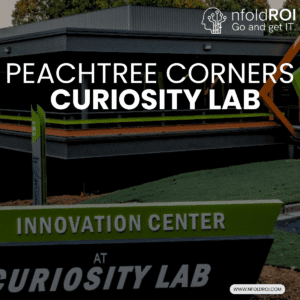Georgia city’s Curiosity Lab becomes premier testing ground for autonomous vehicles and connected infrastructure
PEACHTREE CORNERS, Ga. — In a 500-acre mixed-use development north of Atlanta, the future of transportation and smart city technology is being tested in real-time. Peachtree Corners Curiosity Lab, established in 2019 through a partnership between the City of Peachtree Corners and Curiosity Lab, has emerged as the first real-world connected autonomous vehicle and smart city test environment in the United States.
The facility represents a significant leap forward in how cities can validate emerging technologies before widespread deployment. Unlike traditional testing facilities that rely on controlled environments, Curiosity Lab operates within an active community where autonomous vehicles share roads with regular traffic, pedestrians, and cyclists.
Advanced Infrastructure Enables Real-World Testing
The lab’s technical infrastructure includes a comprehensive 5G and C-V2X communication network that enables vehicles to communicate with traffic signals, other vehicles, and city infrastructure in real-time. A dedicated 1.5-mile autonomous vehicle testing corridor provides space for controlled experiments while maintaining integration with the broader transportation network.
Smart traffic signals throughout the testing area collect data on traffic flow, pedestrian movement, and environmental conditions. This information feeds into an extensive IoT sensor network that monitors everything from air quality to parking availability.
Digital Twin Technology Transforms Urban Planning
Perhaps most significantly, Peachtree Corners has developed a comprehensive digital twin platform that creates a real-time digital replica of the entire testing environment. The system integrates data from IoT sensors, traffic cameras, and connected vehicles to provide dynamic updates on traffic flow, environmental conditions, and vehicle positions.
The digital twin utilizes LIDAR and high-definition mapping to achieve sub-centimeter accuracy positioning, enabling precise simulation and predictive modeling for traffic optimization and autonomous vehicle scenarios. This capability allows researchers to test scenarios virtually before implementing them in the physical environment.
Applications extend beyond transportation to include smart city planning, infrastructure impact modeling, and emergency response scenario planning. The platform has proven valuable for both academic research and industry validation studies.
Industry Partnership Drives Innovation
Major automotive manufacturers, technology companies including Microsoft and Qualcomm, and numerous startups have established partnerships with Curiosity Lab. The facility provides these organizations with access to real-world testing conditions that would be difficult or impossible to replicate in traditional laboratory settings.
The mixed-use nature of the development means that autonomous vehicles must navigate scenarios involving school zones, retail areas, residential neighborhoods, and office complexes — precisely the complex environments where these technologies must eventually operate safely.
Implications for Autonomous Vehicle Development
The lab’s emphasis on MUTCD-compliant traffic sign recognition has particular significance for autonomous vehicle safety. Vehicles operating in the facility must accurately identify and respond to standard traffic control devices while processing real-time communication from connected infrastructure.
This dual approach — combining traditional traffic management systems with next-generation connected technology — provides a pathway for gradual deployment of autonomous vehicle technology in existing communities.
Model for Smart City Development
As cities nationwide grapple with how to evaluate and implement smart city technologies, Peachtree Corners offers a replicable model. The combination of real-world testing conditions, comprehensive data collection, and digital twin modeling provides a framework that other municipalities could adapt to their specific needs.
The success of the Curiosity Lab demonstrates that innovative urban technology doesn’t require building entirely new cities from scratch. Instead, existing communities can evolve incrementally, testing and validating new systems before broader implementation.
The facility continues to expand its capabilities and partnerships, positioning Peachtree Corners as a national leader in smart city innovation and autonomous vehicle development.
